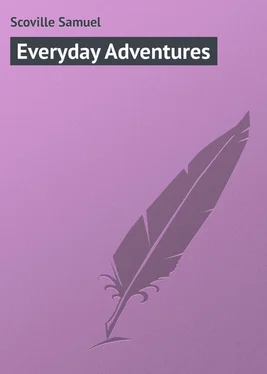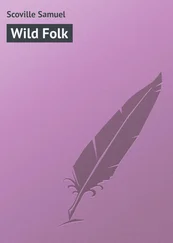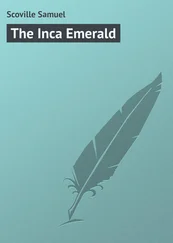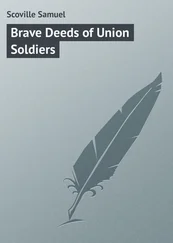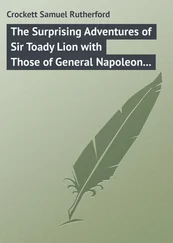Samuel Scoville - Everyday Adventures
Здесь есть возможность читать онлайн «Samuel Scoville - Everyday Adventures» — ознакомительный отрывок электронной книги совершенно бесплатно, а после прочтения отрывка купить полную версию. В некоторых случаях можно слушать аудио, скачать через торрент в формате fb2 и присутствует краткое содержание. Жанр: foreign_prose, foreign_language, на английском языке. Описание произведения, (предисловие) а так же отзывы посетителей доступны на портале библиотеки ЛибКат.
- Название:Everyday Adventures
- Автор:
- Жанр:
- Год:неизвестен
- ISBN:нет данных
- Рейтинг книги:3 / 5. Голосов: 1
-
Избранное:Добавить в избранное
- Отзывы:
-
Ваша оценка:
- 60
- 1
- 2
- 3
- 4
- 5
Everyday Adventures: краткое содержание, описание и аннотация
Предлагаем к чтению аннотацию, описание, краткое содержание или предисловие (зависит от того, что написал сам автор книги «Everyday Adventures»). Если вы не нашли необходимую информацию о книге — напишите в комментариях, мы постараемся отыскать её.
Everyday Adventures — читать онлайн ознакомительный отрывок
Ниже представлен текст книги, разбитый по страницам. Система сохранения места последней прочитанной страницы, позволяет с удобством читать онлайн бесплатно книгу «Everyday Adventures», без необходимости каждый раз заново искать на чём Вы остановились. Поставьте закладку, и сможете в любой момент перейти на страницу, на которой закончили чтение.
Интервал:
Закладка:
Still the Captain was not ready to stop. Up the hillside he led them, by a winding path through tangled thickets, until in a level place he brought them to a group of curious trees. The bark of these was deeply grooved and in places nearly three inches thick, while the branches were covered with scores and scores of golden-red globes. Some were wrinkled and frost-bitten until they had turned brown, but others still hung plump and bright in the winter air. It was a grove of persimmon trees. Before he could be stopped, Henny-Penny had picked one of the best-looking of the lot and took a deep bite out of the soft pulp. Immediately thereafter he spat out his first taste of persimmon with great emphasis, his mouth so puckered that it was with difficulty that he could express his unfavorable opinion of the new fruit.
“Handsome is as handsome does,” warned the Captain. “Try some of the frost-bitten ones.”
The Band accordingly did so, and found that the worst-looking and most wrinkled specimens were sweet as honey and without a trace of pucker. On their way back, they passed through a thicket of tangled bushes, whose branches were all matted together in bunches which looked like birds’ nests. The twigs were laden down with round, purple berries about the size of a wild cherry, and the Captain told the Band that these were hackberries, otherwise known as sugar-berries. They picked handfuls of them, and found that the berry had a sweet spicy pulp over a fragile stone that could be crushed like the stones of a raisin, while the fruit when eaten resembled a raisin in taste.
Hurrying back to the camp-fire tree, the Captain dug a round circle a couple of feet in diameter in the snow, and spread down a layer of dry leaves. Over these he built a little tepee of tiny, dry, black-oak twigs. Underneath this he placed a fragment of birch-bark which he had peeled off one of the aspen birches which grew on the fringe of the swamp. This burned like paper, and in a minute the little ball of dry twigs was crackling away with a steady flame. Over this he piled dry sassafras and hickory boughs, and in a few moments the Band was seated around a column of flame which roared up fully four feet high. With their backs against the great oak tree, they cracked and cracked and cracked black walnuts and crunched sugar-berries and nibbled nanny-plums and tasted frost-grapes – saving the single sandwich until next to the last; while for desert they had handfuls and handfuls of honey-sweet, wrinkled persimmons.
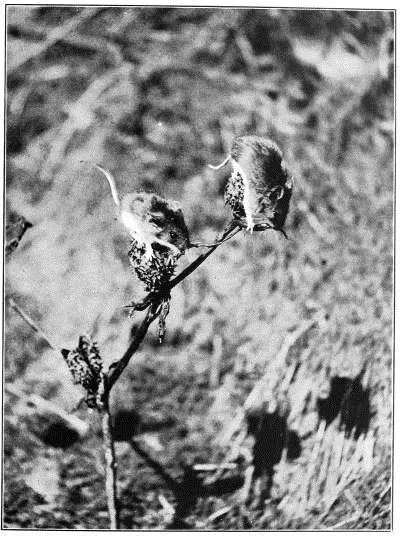
THE DEAR DEER MICE
Near the fire Lieutenant Trottie found an old box-cover bedded in the snow. As he lifted it up, there was a rush and a scurry, and from a round, warm nest underneath the cover, made of thistle-down, fur, feathers, and tiny bits of woodfibre all matted together into a sort of felt, dashed six reddish-brown, pink-pawed mice. They burrowed in the snow, crept under the leaves, and in a minute were out of sight, all except one, which tried to climb the box-cover and which Trottie caught before he could scurry over the top of it. His fur was like plush, with the hair a warm reddish-brown at the ends and gray at the roots. Underneath he was snowy-white, although there, too, the fur showed mouse-gray under the surface. He had little brown claws and six tiny pink disks on each paw, which enabled him to run up and down perpendicular surfaces. His eyes were big and brown and lustrous, and he had flappy, pinky-gray, velvet ears, each one of which was half the size of his funny little face and thin as gossamer. His paws were pink and his long tail was covered with the finest of hairs. When he found he was fairly caught, he snuggled down into Trottie’s hand, making a queer little whimpering noise, while his nose wrinkled and quivered. When Trottie brought him to the fire, Henny-Penny offered him a half-kernel of one of his walnuts. Instantly the little nose stopped quivering, and Mousy sat up like a squirrel on the back of Trottie’s hand and nibbled away until the piece was all gone. Each one of the Band took turns in feeding him until he could eat no more. Then Trottie put him back in the deserted nest and replaced the box-cover.
The last adventure of all was on the way home. We were walking along an abandoned railroad track, when suddenly a flock of light grayish birds flew up all together out of the dry grass and lighted in a small elm tree nearby. As we watched them, they turned and all flew down together. Instantly it was as if a mass of peach-blossoms had been spilled on the withered grass and white snow. Fully a third of the flock had crimson crowns and rose-colored breasts, while at the base of the streaked gray-and-brown backs showed a tinge of pink. It was our first flock of the lesser redpolls all the way down from the Arctic Circle. They were restless but not shy, and sometimes we were able to get within six feet of them. They would continually fly back and forth from the tree to the ground, keeping up a soft chattering interspersed with little tinkling notes, somewhat resembling the goldfinch or the siskin which we had left behind us in the swamp. Always, when they flew, they gave a little piping call, and their field-mark was a black patch under the throat which could be seen even farther than their red polls or their rosy breasts. Their beaks were light and very pointed, and they had forked tails like the siskin.
It was nearly twilight when we left them and at last started home. As we followed a fox-trail in and out through the thickets of Fern Valley, we caught a glimpse of a large brown bird on the ground. At first I thought that it was some belated fox sparrow; but when it hopped to a low twig and then raised its tail stiffly as I watched, I recognized the hermit thrush, which always betrays itself by this curious mannerism. The last one I had seen was singing like Israfel, in the twilight of a Canadian forest. To-day the little singer was silent, and I wondered what had kept him back from the southland, and hoped that he would be able to win through the bitter days still ahead of him. I have no doubt that he did, for the hermit thrush is a brave-hearted, hardy, self-reliant bird.
The sun had gone down before we finally reached the road. Above the after-glow showed a patch of apple-green sky against which was etched the faintest, finest, and newest of crescent moons. It almost seemed as if a puff of wind would blow her like a cobweb out of the sky. Above gleamed Venus, the evening star, all silver-gold; while over toward the other side of the sky, great golden Jupiter echoed back her rays. Below the green, the sky was a mass of dusky gold which deepened into amber and then slowly faded. As we walked home through the twilight, we heard the last, sweetest, and saddest singer of that winter day. Through the air shuddered a soft tremolo call, like the whistling of swift, unseen wings or the wail of a little lost child. It was the eerie call of the little screech-owl – and never was a bird worse named. Answering, I brought him so close to us that we could see his ear-tufts showing in the half-light. All the way home he followed us, calling and calling for some one who will never come.
III
SNOW STORIES
The sun went down in a spindrift of pale gold and gray, which faded into a bank of lead-colored cloud. The next morning the woods and fields were dumb with snow. No blue jays squalled, nor white-skirted juncos clicked; neither were there any nuthatches running gruntingly up and down the tree-trunks. There was not even the caw of a passing crow from the cold sky. As I followed an unbroken wood-road, it seemed as if all the wild-folk were gone.
The snow told another story. On its smooth surface were records of the lives that had throbbed and passed and ebbed beneath the silent trees. Just ahead of me the road crossed a circle where, a half-century ago, the charcoal-burners had set the round stamp of one of their pits. On the level snow there was a curious trail of zigzag tracks. They were deep and close-set, and made by some animal that walked flat-footed. I recognized the trail of the unhasting skunk. Other animals may jump and run and skurry through life, but the motto of the skunk is, “Don’t hurry, others will.” The tracks of the fore-paw, when examined closely, showed long claw-marks which were absent from the print of the hind feet. Occasionally the trail changed into a series of groups of four tracks arranged in a diagonal straight line, which marked where the skunk had broken into the clumsy gallop which is its fastest gait. Most of the time this particular skunk had walked in a slow and dignified manner. By the edge of the woods he had stopped and dug deeply into a rotten log, evidently looking for winter-bound crickets and grubs.
Читать дальшеИнтервал:
Закладка:
Похожие книги на «Everyday Adventures»
Представляем Вашему вниманию похожие книги на «Everyday Adventures» списком для выбора. Мы отобрали схожую по названию и смыслу литературу в надежде предоставить читателям больше вариантов отыскать новые, интересные, ещё непрочитанные произведения.
Обсуждение, отзывы о книге «Everyday Adventures» и просто собственные мнения читателей. Оставьте ваши комментарии, напишите, что Вы думаете о произведении, его смысле или главных героях. Укажите что конкретно понравилось, а что нет, и почему Вы так считаете.
